Green tea is known for its refreshing taste and possible health benefits, but people who watch how much caffeine they take in may want to know: How much caffeine does green tea have? Green tea is a staple in many countries and is praised for being full of antioxidants and having the potential to speed up the metabolism.
However, the amount of caffeine in it can be a problem, especially for people who are sensitive to caffeine or who want to limit how much they drink. The usual amount of caffeine in an 8-ounce (240 ml) cup of green tea is between 20 and 45 milligrams. Compared to its stronger cousin, black tea, and the strong espresso, this makes green tea a middling source of caffeine. The amount of caffeine can change depending on the type of green tea, how long it is brewed, the temperature of the water, and the brand. Even though green tea has less caffeine than a normal cup of coffee, it still makes people feel more energized in different ways. Green tea might be a good choice if you want a lower caffeinated drink with a variety of possible health benefits.
In the parts that follow, we’ll talk more about the things that affect how much caffeine is in green tea and how its caffeine content compares to that of other popular drinks.
Understanding Caffeine in Green Tea
Caffeine is a natural stimulant that can be found in plants like tea leaves, coffee beans, and cacao. It makes you feel more awake and active. Caffeine is found in green tea, which comes from the Camellia sinensis plant. However, green tea has less caffeine than black tea and coffee. A cup of green tea that is 8 ounces (240 ml) long has about 30 to 50 milligrams of caffeine on average.
The amount of caffeine in green tea can change a lot, though, depending on things like the type of green tea, how it’s made, the temperature of the water, how long it’s steeped, and how good the tea leaves are. Different cups of green tea can have different amounts of caffeine because of these factors.
There may be 30–50 mg of caffeine in a cup of green tea
You are right, no doubt. In fact, a cup of green tea can have anywhere from 30 to 50 milligrams of caffeine. This difference comes from things like the type of green tea, how it’s made, and the brand. People should be aware of this range, especially if they are keeping track of how much caffeine they are taking or are sensitive to its effects. Green tea is still a popular choice for people who want a mild caffeine boost and also want to enjoy its possible health benefits and calming effects.
How you make green tea affects the amount of caffeine in your cup.
Most of the time, green tea should be made (sub-boiled) at a temperature between 75°C and 90°C. This lower suggested brewing temperature means that a green tea infusion should have less caffeine than a cup that has been steeped in boiling hot water. If you don’t do this and use hot water to make your green tea, the amount of caffeine in your cup might be higher than what the package says.
Tea brewed at half strength is a smart way for people who know what they’re doing to cut down on how much caffeine they take in. To make a less caffeinated, lighter cup of green tea, just use half the amount of tea leaves you would usually use, or about twice as much water if you’re using a tea bag.
Most green teas should be brewed for 90–180 seconds, as suggested. If you let your tea steep for longer than this, it will also have more caffeine. On the other hand, if you follow what the Chinese say and throw away the first blend and only use the second, your drink will have less caffeine.
Caffeine is a natural stimulant that can be found in plants like tea leaves, coffee beans, and cacao. It makes you feel more awake and active. Caffeine is found in green tea, which comes from the Camellia sinensis plant. However, green tea has less caffeine than black tea and coffee. A cup of green tea that is 8 ounces (240 ml) long has about 30 to 50 milligrams of caffeine on average.
The amount of caffeine in green tea can change a lot, though, depending on things like the type of green tea, how it’s made, the temperature of the water, how long it’s steeped, and how good the tea leaves are. Different cups of green tea can have different amounts of caffeine because of these factors.
Factors Influencing Caffeine Content
- Brewing Time: The amount of caffeine in the tea depends on how long the tea leaves simmer in hot water. When you let tea brew for longer, it gets more caffeine. If you want a cup with less caffeine, you can shorten the time the tea is steeped.
- Temperature of the water: In general, more caffeine is extracted when the water is hotter. Using water that is a little bit cooler can help reduce the amount of caffeine in your green tea.
- Tea Leaf Grade: The amount of caffeine in tea is also affected by how big and good the tea leaves are. When leaves are finely ground or broken, they have a bigger surface area, which allows more caffeine to be released when they are brewed. On the other hand, using rougher leaves can help keep the caffeine level low.
- Type of Green Tea: Different kinds of green tea, each with its own qualities, can have different amounts of caffeine. For example, matcha, which is a powdered green tea, usually has more caffeine because the whole tea leaf is used. Two famous loose-leaf green teas, Sencha and Gyokuro, have different amounts of caffeine.
- Geographical Origin: The amount of caffeine in tea can also be affected by where it is made. Changes in caffeine amounts can be caused by the environment, the soil, and how the plant was grown.
Comparing Green Tea’s Caffeine Content
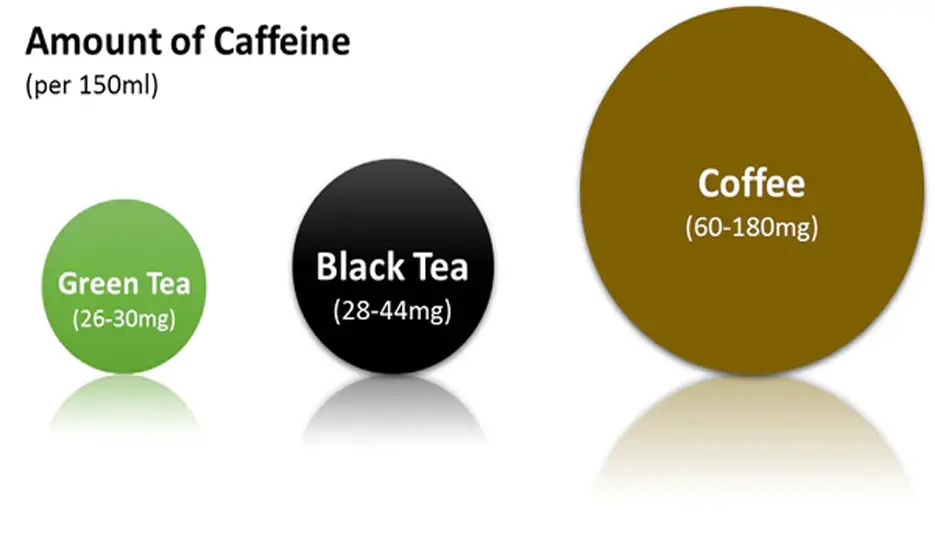
To get an idea of how much caffeine is in green tea, it’s helpful to compare it to other popular drinks:
- Black Tea: Green tea has less energy than black tea, on average. A cup of black tea usually has between 40 and 70 milligrams of caffeine, but this can change depending on the same things we talked about before.
- Coffee: People know that coffee has more energy than other drinks. Depending on how it was made and what kind of coffee was used, an 8-ounce (240 ml) cup of brewed coffee can have anywhere from 80 to 100 milligrams of caffeine or even more.
- Soft Drinks: Some sports drinks and soft drinks also have caffeine in them. The amount of caffeine in an 8-ounce dose of these drinks can range from 20 to 50 milligrams.
- Energy Drinks: Energy drinks are meant to give you a quick boost of energy. They can have different amounts of caffeine, usually more than 100 milligrams per dose.
Balancing Caffeine and Health Benefits
Green tea has a small amount of caffeine and may be good for your health in other ways as well. It has antioxidants called catechins, especially epigallocatechin gallate (EGCG), which has been linked to a number of health benefits, such as better heart health, the ability to control weight, and antioxidant qualities. Green tea also has the amino acid L-theanine in it, which can have calming benefits that balance out the effects of caffeine. People often feel focused and alert after drinking green tea, and this mix is thought to be the reason why.
Conclusion
Even though green tea has less caffeine than coffee and many other drinks, the amount of caffeine in green tea is not always the same. It depends on many things, like the type of green tea you use and how you make it. By knowing these factors, you can change how you drink green tea to get the amount of caffeine you want. Whether you want a mild energy boost or to enjoy the possible health benefits of green tea, learning how to deal with its caffeine content gives you the power to make choices that are in line with your preferences and health.
Frequently Asked Questions
Is green tea very high in caffeine?
If the amount of energy in coffee bothers you, try green tea instead. It has caffeine too, but not as much as coffee. The Mayo Clinic says that there are between 95 and 165 mg of caffeine in 8 oz of caffeinated brewed coffee, while there are between 25 and 29 mg of caffeine in 8 oz of brewed green tea.
How much caffeine is in green tea vs coffee?
Coffee generally has more caffeine than green tea.
The FDA says that an 8-ounce cup of coffee usually has between 80 and 100 mg of caffeine. Green tea, on the other hand, has between 30 and 50 mg of caffeine in an 8-ounce cup.
Is 100% green tea caffeine free?
Does caffeine show up in green tea? Green tea has caffeine in it by nature, just like black, white, and Oolong tea. Even though green tea has less energy than black tea and a lot less than coffee.



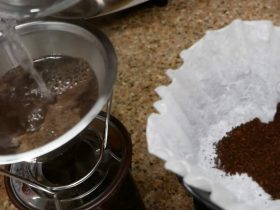

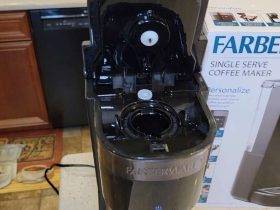



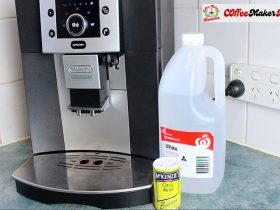


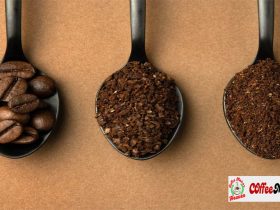

Leave a Reply